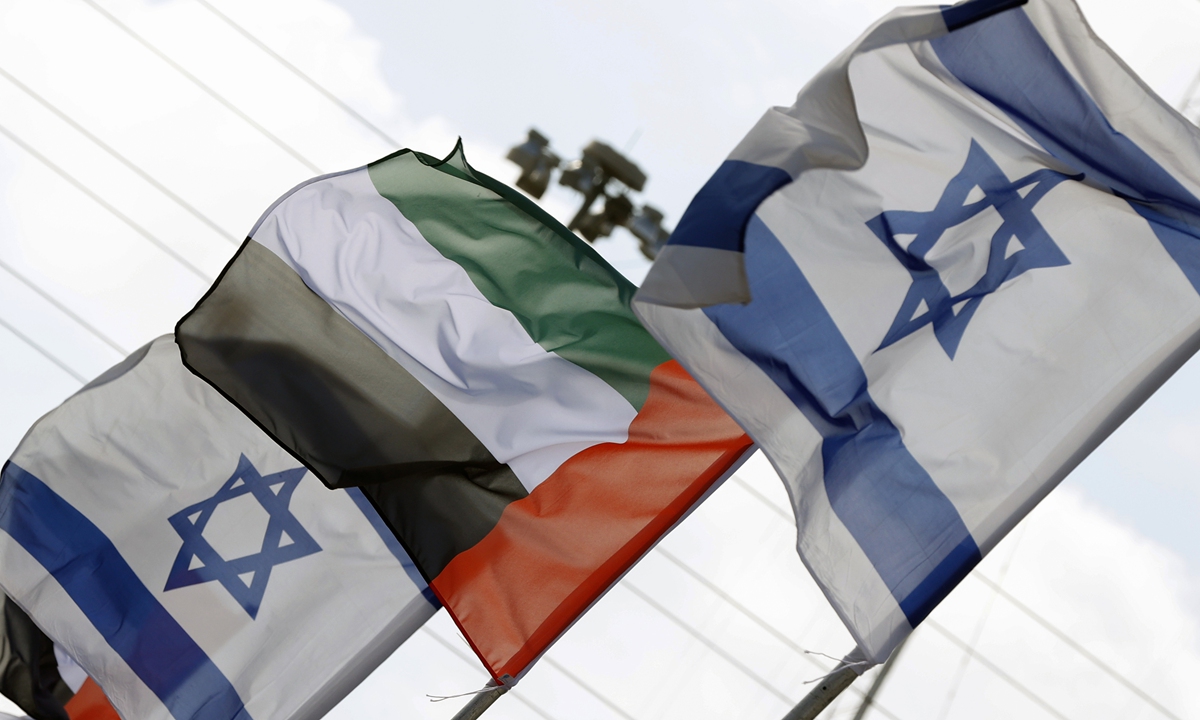Israel and UAE peace shows new Mideastern landscape emerging
By Niu Xinchun Source: Global Times Published: 2020/8/18 17:48:41

Israeli and United Arab Emirates flags line a road in the Israeli coastal city of Netanya, on Sunday. Photo: AFP
Israel and the United Arab Emirates (UAE) recently reached a peace agreement under US mediation - and the two are now establishing full diplomatic relations.
The historic significance of the latest development is that without the participation of Palestine, Israel will have established diplomatic ties with an important Arab country. Israel's Ministry of Intelligence said on Sunday that Bahrain and Oman could be the next Gulf countries to follow the suit of the UAE to formalize their ties with Israel.
The Beirut Declaration issued by the Arab summit in 2002 stipulates that solving the Palestine issue and setting up an independent Palestinian state are prerequisites for Arab countries to establish diplomatic ties with Israel. Since 2009, Israeli Prime Minister Benjamin Netanyahu has been insisting that Israel could build full diplomatic relationships with Arab countries without settling the Palestinian conflict first.
What he said was against conventional wisdom back then, but now it has come true. This means the political landscape of the Middle East has changed.
First, the Palestine issue is not the core of Middle Eastern politics anymore. Since 1948, four wars in the region came to dominate the evolution of Middle Eastern politics. For a long time, people believed as long as the Palestine issue was solved, the other issues would be solved accordingly. Now the UAE has established ties with Israel bypassing the thorny issue. This means the Palestine issue will only be one of the many issues in the region.
Second, the importance of Iran in the region has been lifted. Currently, the Iranian economy is being confronted with tremendous pressure, as Washington and Tehran intensify their standoff. The Iranian nuclear issue is returning to where it was before the historic agreement, making relations between Iran and its neighboring countries such as Saudi Arabia and Israel more strained. All these issues are intertwined. Any one of them could exert pressure on the overall regional situation. The establishment of diplomatic ties between the UAE and Israel obviously targets Iran to some extent.
Third, the status of Arab countries as a whole in Middle Eastern politics is declining. For a long time, the Middle East was under the Arab countries' sphere of influence, and the influence of non-Arab countries is limited. Now Arab countries are either engaged in civil war or are facing domestic political turbulence. Saudi Arabia and Qatar are competing with each other. The regional influence of Arab countries is diminishing.
Fourth, the importance of the Palestine issue in Arab politics is declining. The issue used to be the single most important agenda for the Arab League. Confronted with challenges from Iran, the Syrian civil war, the oil crisis, economic recession and youth unemployment, Arab countries have to battle more urgent problems.
Fifth, the influence of religion and pan-Arabism in Middle Eastern politics is waning, with people focusing more and more on domestic issues. For Arab countries which do not have territorial disputes with Israel, Islam and pan-Arabism are the reasons why they attach importance to the Palestine issue.
In recent years, the US recognized Jerusalem as the capital of Israel. Moreover, Israel tried to annex parts of the West Bank, and the UAE and Israel normalized ties. None of these moves triggered large-scale backlash from the Arab people. This further shows that the focus of Arab people has shifted.
Sixth, the Middle East can hardly be claimed as a venue for major powers to wrangle for influence anymore. In historical terms, the Middle East used to be of great geopolitical importance where the big powers competed for dominance. Now that the US is strategically withdrawing, Russia has adopted a prudent strategic manner, and Europe and China have no will to take up this strategic vacuum, these powers tend to be stepping back from Middle Eastern affairs.
Last but not least, the US support is not reliable anymore. Arab countries have to find a way out themselves. The US had been providing security shelters for Gulf Arab countries. Since 2011, due to the financial crisis, the dilemma of the Iraq war, and the failure of the "Arab spring," the US started to contract from the Middle East.
In 2019, when oil processing facilities in Saudi Arabia were attacked, the US did not retaliate. Gulf countries have realized that they must seek their own way. The normalization of ties between the UAE and Israel can be seen as their attempt to seek security.
The author is research professor and director of the Institute of Middle East Studies, China Institutes of Contemporary International Relations. opinion@globaltimes.com.cn
RELATED ARTICLES:
Posted in: VIEWPOINT